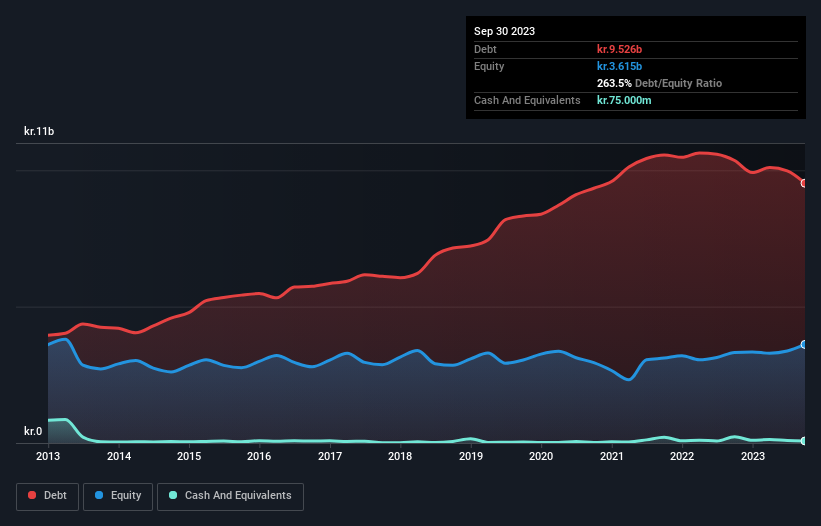- Denmark
- /
- Infrastructure
- /
- CPSE:KBHL
These 4 Measures Indicate That Københavns Lufthavne (CPH:KBHL) Is Using Debt Reasonably Well

The external fund manager backed by Berkshire Hathaway's Charlie Munger, Li Lu, makes no bones about it when he says 'The biggest investment risk is not the volatility of prices, but whether you will suffer a permanent loss of capital.' So it might be obvious that you need to consider debt, when you think about how risky any given stock is, because too much debt can sink a company. As with many other companies Københavns Lufthavne A/S (CPH:KBHL) makes use of debt. But the more important question is: how much risk is that debt creating?
What Risk Does Debt Bring?
Debt is a tool to help businesses grow, but if a business is incapable of paying off its lenders, then it exists at their mercy. Part and parcel of capitalism is the process of 'creative destruction' where failed businesses are mercilessly liquidated by their bankers. However, a more frequent (but still costly) occurrence is where a company must issue shares at bargain-basement prices, permanently diluting shareholders, just to shore up its balance sheet. Of course, debt can be an important tool in businesses, particularly capital heavy businesses. The first step when considering a company's debt levels is to consider its cash and debt together.
Check out our latest analysis for Københavns Lufthavne
What Is Københavns Lufthavne's Net Debt?
The image below, which you can click on for greater detail, shows that Københavns Lufthavne had debt of kr.9.53b at the end of September 2023, a reduction from kr.10.4b over a year. Net debt is about the same, since the it doesn't have much cash.

How Strong Is Københavns Lufthavne's Balance Sheet?
We can see from the most recent balance sheet that Københavns Lufthavne had liabilities of kr.1.55b falling due within a year, and liabilities of kr.10.2b due beyond that. Offsetting this, it had kr.75.0m in cash and kr.514.0m in receivables that were due within 12 months. So its liabilities total kr.11.1b more than the combination of its cash and short-term receivables.
This deficit isn't so bad because Københavns Lufthavne is worth kr.36.2b, and thus could probably raise enough capital to shore up its balance sheet, if the need arose. But it's clear that we should definitely closely examine whether it can manage its debt without dilution.
We use two main ratios to inform us about debt levels relative to earnings. The first is net debt divided by earnings before interest, tax, depreciation, and amortization (EBITDA), while the second is how many times its earnings before interest and tax (EBIT) covers its interest expense (or its interest cover, for short). The advantage of this approach is that we take into account both the absolute quantum of debt (with net debt to EBITDA) and the actual interest expenses associated with that debt (with its interest cover ratio).
With a net debt to EBITDA ratio of 5.9, it's fair to say Københavns Lufthavne does have a significant amount of debt. However, its interest coverage of 3.0 is reasonably strong, which is a good sign. However, it should be some comfort for shareholders to recall that Københavns Lufthavne actually grew its EBIT by a hefty 211%, over the last 12 months. If that earnings trend continues it will make its debt load much more manageable in the future. The balance sheet is clearly the area to focus on when you are analysing debt. But you can't view debt in total isolation; since Københavns Lufthavne will need earnings to service that debt. So if you're keen to discover more about its earnings, it might be worth checking out this graph of its long term earnings trend.
Finally, while the tax-man may adore accounting profits, lenders only accept cold hard cash. So it's worth checking how much of that EBIT is backed by free cash flow. Over the last two years, Københavns Lufthavne recorded free cash flow worth a fulsome 97% of its EBIT, which is stronger than we'd usually expect. That positions it well to pay down debt if desirable to do so.
Our View
Københavns Lufthavne's conversion of EBIT to free cash flow suggests it can handle its debt as easily as Cristiano Ronaldo could score a goal against an under 14's goalkeeper. But the stark truth is that we are concerned by its net debt to EBITDA. It's also worth noting that Københavns Lufthavne is in the Infrastructure industry, which is often considered to be quite defensive. All these things considered, it appears that Københavns Lufthavne can comfortably handle its current debt levels. Of course, while this leverage can enhance returns on equity, it does bring more risk, so it's worth keeping an eye on this one. When analysing debt levels, the balance sheet is the obvious place to start. But ultimately, every company can contain risks that exist outside of the balance sheet. To that end, you should be aware of the 2 warning signs we've spotted with Københavns Lufthavne .
If, after all that, you're more interested in a fast growing company with a rock-solid balance sheet, then check out our list of net cash growth stocks without delay.
Valuation is complex, but we're here to simplify it.
Discover if Københavns Lufthavne might be undervalued or overvalued with our detailed analysis, featuring fair value estimates, potential risks, dividends, insider trades, and its financial condition.
Access Free AnalysisHave feedback on this article? Concerned about the content? Get in touch with us directly. Alternatively, email editorial-team (at) simplywallst.com.
This article by Simply Wall St is general in nature. We provide commentary based on historical data and analyst forecasts only using an unbiased methodology and our articles are not intended to be financial advice. It does not constitute a recommendation to buy or sell any stock, and does not take account of your objectives, or your financial situation. We aim to bring you long-term focused analysis driven by fundamental data. Note that our analysis may not factor in the latest price-sensitive company announcements or qualitative material. Simply Wall St has no position in any stocks mentioned.
About CPSE:KBHL
Københavns Lufthavne
Owns, develops, and operates Copenhagen Airport and Roskilde Airport in Denmark.
Solid track record with imperfect balance sheet.


